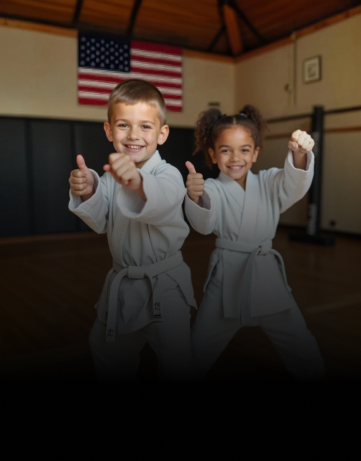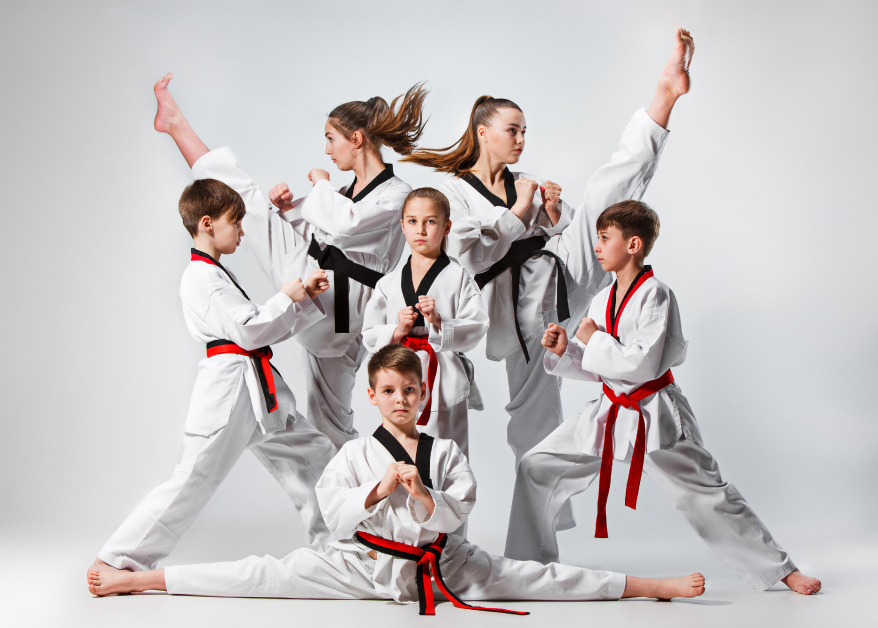Exactly How Martial Arts for Children Can Boost Self-confidence and Technique in Youthful Martial Artists
Karate for youngsters supplies an one-of-a-kind opportunity to construct confidence and self-control in young martial musicians. As they learn new techniques and face difficulties, they not just obtain skills however additionally create a solid feeling of self-worth. This organized setting motivates them to appreciate the trip of improvement. However how does this training equate into their day-to-day lives? Discover the deeper connections that make karate more than just a sporting activity.
The Relevance of Self-confidence in Childhood Growth
Self-confidence is an essential structure block in youth advancement. When you nurture your youngster's self-worth, you equip them to face difficulties, take threats, and share themselves freely. Youngsters with self-confidence are a lot more happy to check out social situations and brand-new tasks, which can cause long lasting friendships and beneficial experiences.Encouraging your youngster to step out of their comfort zone cultivates durability. They learn that failing isn't completion but instead a tipping stone to success. By commemorating their accomplishments, no matter exactly how little, you help them acknowledge their capabilities and worth.In this trip, support and positive reinforcement from you play a crucial duty. Whether it's through appreciation or just being present, your involvement increases their confidence. As they expand, this confidence comes to be a lifelong asset, furnishing them to navigate both challenges and opportunities with a solid feeling of self.
How Martial Arts Shows Self-control and Emphasis
Karate assists you construct technique and focus with its organized training routine. As you practice mindfulness during each session, you'll discover to focus much better both on and off the mat. And also, establishing and accomplishing objectives in martial arts reinforces your ability to stay alert and dedicated.
Structured Training Program
While you engage in karate training, you'll promptly uncover how a structured routine infuses discipline and emphasis in young practitioners. Each course adheres to a details format, including workouts, strategy method, and sparring. This consistency teaches you to value the process and devote to improvement. As you discover types and techniques, you create a feeling of obligation for your very own progress.The organized atmosphere urges you to establish goals, whether grasping a new belt or refining a kata. You'll discover that remaining focused during drills and classes hones your concentration. The self-control you cultivate in karate expands beyond the dojo, positively impacting your schoolwork and everyday routines. Each session reinforces the significance of devotion, aiding you grow into an extra regimented individual.
Mindfulness in Method
As you practice martial arts, you'll discover that mindfulness becomes a crucial part of your training. Each action requires your full interest, aiding you remain focused on the present minute. You'll learn to ignore diversions and focus on your breathing, movements, and purposes. This increased recognition develops your reflexes and boosts your discipline.During sparring or kinds, you'll find the value of being emotionally existing - Karate Salisbury MD. You'll discover how this focus not just boosts your strategy but additionally develops your self-confidence. By exercising mindfulness in karate, you grow patience and durability, crucial characteristics that extend beyond the dojo. In this way, karate shows you to harness your mind, helping you create a regimented approach to obstacles both on and off the floor covering

Objective Setting Techniques
Establishing objectives in martial arts isn't simply about gaining belts; it's an effective means to grow technique and focus. When you establish certain, possible targets, you produce a roadmap for your progress. As an example, rather of just intending to improve your kicks, attempt concentrating on grasping a specific strategy monthly. This method keeps you motivated and engaged.Breaking down bigger goals right into smaller sized, manageable actions assists you track your progress and celebrate tiny victories along the road. Whether it's perfecting your position or enhancing your sparring endurance, every objective reinforces your commitment. As you achieve these goals, you'll build confidence in your abilities and develop a solid sense of discipline that prolongs beyond the dojo right into daily life.
Building Resilience Via Martial Arts
Martial arts, particularly martial arts, provides kids an one-of-a-kind chance to build durability in a supportive atmosphere. In courses, they deal with difficulties that press their restrictions, whether it's grasping a new technique or sparring with a companion. Each trouble, like a missed kick or a lost match, ends up being a possibility to discover and grow.As they practice, children discover to accept discomfort and keep attempting, also when points get difficult. They find that failing isn't the end; it belongs to the trip. This frame of mind assists them get better stronger, not just in the dojo, yet in daily life.With each obstacle they overcome, your child builds self-confidence in their capacity to take on barriers, sustaining their decision. Through karate, they'll understand that strength isn't nearly physical stamina; it's regarding mental grit and determination, empowering them to face whatever life tosses their way.
The Duty of Respect in Martial Arts Educating
Respect is a foundational concept in karate training, promoting a society of technique and sociability among pupils. When you step onto the dojo floor, you're not simply discovering strategies; you're also discovering to respect your instructors, peers, and the art itself (Karate Salisbury MD). Bowing at the start and end of course isn't just a procedure; it symbolizes your recommendation of others' initiatives and dedication.As you create shared respect, you'll find it enhances your knowing experience. You'll pay attention much more diligently to your teacher and gain insights from fellow students. This atmosphere encourages constructive criticism and support, allowing everyone to expand together.Moreover, respect cultivates self-discipline. Recognizing the worth of effort and humbleness assists you stay concentrated on your training. In turn, this respect converts right into your daily life, boosting your communications and connections outside the dojo. Via martial arts, you discover that regard is essential for personal growth and area structure
Establishing Goals and Accomplishing Success in Karate

Social Abilities and Synergy in the Dojo
While training in why not check here the dojo, children naturally develop essential social skills and teamwork capacities. As they practice together with peers, they find out to connect effectively, share area, and assistance one an additional. Each class presents chances for collaboration, whether it's during partner drills or group workouts. This synergy fosters friendships and produces a feeling of belonging, making the dojo a nurturing environment.Kids additionally acquire important dispute resolution abilities. When they experience challenges, such as disputes during sparring, they find out to navigate these scenarios constructively. They practice persistence and empathy, comprehending that everybody has different staminas and weaknesses.Moreover, getting involved in group activities cultivates a sense of responsibility. You'll see your child learning to rely upon teammates and take obligation for their function in a group. These experiences not just improve their fighting styles journey however also outfit them with social devices they'll lug right into other areas of life.

The Long-Term Perks of Martial Arts Beyond Youth
As youngsters grow up and move into their adult years, the advantages of martial arts prolong much beyond the dojo. You'll find that the technique and emphasis discovered with karate can translate into your professional and scholastic life. Setting and achieving objectives in fighting styles promotes a strong job values, which can push you to master any kind of endeavor.Moreover, the confidence obtained from mastering strategies and sparring can enhance your self-esteem, aiding you tackle challenges head-on. This resilience becomes vital as you encounter the unpredictabilities of adulthood.Additionally, the social skills developed via team effort and friendship here in the dojo can lead to far better partnerships in both individual and professional balls. You'll learn to connect efficiently, willpower conflicts, and develop a supportive network.Ultimately, karate shapes not just knowledgeable martial musicians, however all-round people ready to handle the globe.
Frequently Asked Concerns
What Age Is Finest to Beginning Martial Arts for Kids?
You can begin martial arts as very early as age 4 or five, however it usually depends upon your kid's maturation and rate of interest. Discovering a course that matches their age and power level makes a huge distinction.
Are There Any Kind Of Health Benefits From Exercising Martial Arts?
Yes, practicing karate offers many wellness benefits. You'll boost your strength, adaptability, and control while improving cardiovascular fitness. Plus, it enhances focus and psychological well-being, making it a wonderful option for total physical and psychological health.
Exactly How Frequently Should Children Go To Martial Arts Classes?
You should encourage your kids to go to karate classes at the very least 2 to 3 times a week. Uniformity assists them learn strategies properly and develop skills, making their experience more delightful and gratifying in the future.
Can Karate Assist With Taking Care Of Anxiety in Children?
Yes, karate can help take care of anxiety in youngsters. It shows focus and self-constraint while supplying a safe electrical outlet for power. You'll notice your youngster expanding extra confident and calm as they practice frequently.
What Gear Is Required for Kids Beginning Martial Arts?

Comments on “Legacy Martial Arts – Unlock the Legacy of Tradition in Youth Martial Arts”